 |
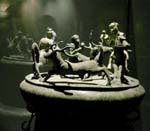 |
Two bronze cowrie containers.
The one on the left was found at Lijiashan, Jiangchuan county. Western
Han Dynasty 206 BC to 8 AD |
 |
Bronzeware basket in the
shape of a snake. Found at Lijiashan, Jiangchuan county. Western Han Dynasty
206 BC to 8 AD |
| Taming
Horses |
Hunting |
|
Snake
image |
|
 |
|
|
|
|
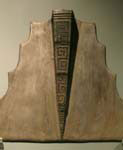
|
Two bent bladed bronze hoes
found at Lijiashan, Jiangchuan county. Western Han Dynasty 206 BC to 8
AD. Notice what is almost a Greek key design at left. |

|
Bronze hoe inscribed with
peacocks found at Shizhaishan, Jinning county. Western Han Dynasty 206
BC to 8 AD |
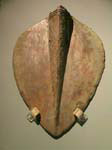
|
|
Geometric
Design Bronze Hoe
|
|
Bronze
Hoe
|
|
Peacock
Hoe
|
 |
|
|
|
|
| |
|
 |
Details of peacock designs
on the left and right sides of the hoe above. |
 |
 |
|
Left
Peacock |
|
Right
Peacock |
 |
|
|
|
|

|
 |
This bronze cowrie container
shows an artistic restraint used to emphasize the perfect form of the figure.
Found at Lijiashan, Jiangchuan county. Western Han Dynasty 206 BC to 8
AD |

|
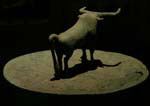
|
|
Bronze
Cowrie Container
|
Cowrie
Container - View 2
|
|
Cowrie
Container - View 3
|
Cowrie
Container - View 4
|
 |
|
|
|
|
 |
|
|
|
|

|
Two men hunting a pig on
a bronze buckle found at Lijiashan, Jiangchuan county. Warring States period,
475 to 221 BC. |
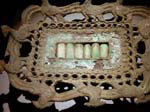 |
Chickens surround this rectangular
bronze buckle found at Lijiashan, Jiangchuan county. Western Han Dynasty
206 BC to 8 AD |
|
| Hunting
Pig |
|
Chickens |
|
|
 |
|
|
|
|
| A man hunting a deer is
depicted on this two dimensional buckle found at Shizhaishan, Jinning county.
Warring States period, 475 to 221 BC. |
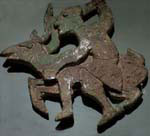
|
A deer hunter is again depicted
on a three dimensional bronze buckle found at Lijiashan, Jiangchuan county.
Western Han Dynasty 206 BC to 8 AD |

|
|
|
Hunting
Deer
|
|
Deer
Hunter
|
|
 |
|
|
|
|
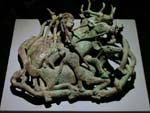 |
Two men hunting deer on
this bronze buckle from the Warring States period, 475 to 221 BC.
Found at Lijiashan, Jiangchuan county. |
|
Eight men hunting a tiger
on a buckle found at Shizhaishan, Jinning county. Western Han Dynasty 206
BC to 8 AD |
 |
| Two
Deer Hunters |
|
|
|
Hunting
Tiger |
 |
|
|
|
|
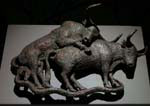 |
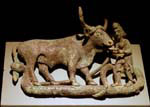 |
On the left, bronze buckles showing oxen mating and a man feeding an ox were found at Lijiashan, Jiangchuan county. Western Han Dynasty 206 BC to 8 AD. On the right, two men rope an ox on a gilded bronze buckle found at Shizhaishan, Jinning county also dated to the Western Han period. Note the use of a snake to form the ground pattern. |
 |
 |
| Oxen
Mating |
Feeding
an Ox |
|
Roping
an Ox |
Roping
an Ox - Detail |
 |
|
|
|
|
 |
|
|
|
|
| The cloud design is used
extensively throughout the history of Chinese art. Here it is found
in a circular buckle, about 6 inches in diameter. Found at Shizhaishan,
Jinning county. Western Han Dynasty 206 BC to 8 AD |
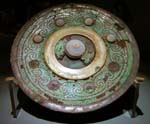
|
|

|
Monkeys decorate the edge
of this gilded bronze buckle. Found at Shizhaishan, Jinning county.
Western Han Dynasty 206 BC to 8 AD |
|
Clouds
|
|
Monkeys
|
|
 |
|
|
|
|

|
Gold buckle found at Yangfutou,
Guandu district. Western Han Dynasty 206 BC to 8 AD |

|
Two views of a buckle depicting
an ox fight. You can almost hear the people placing bets.
Found at Shizhaishan, Jinning county. Western Han Dynasty 206 BC to 8 AD |

|
|
Gold
Buckle
|
|
Ox
Fight 1
|
|
Ox
Fight 2
|
 |
|
|
|
|
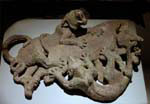 |

|
The two buckles to the left
were found at Shizhaishan, Jinning county. They depict tigers attacking
a wild pig and three tigers carrying an ox. Both date from the Western
Han Dynasty 206 BC to 8 AD |
An earlier buckle found
at Lijiashan, Jiangchuan county, Warring States period, 475 to 221 BC has
a similar theme. Three wolves attacking a goat. |

|
| Tigers
Attacking |
Carrying
an Ox |
|
|
Wolves
Attacking |
 |
|
|
|
|
| The statue of a woman on
the right is about 1 and a half feet tall. Found at Shizhaishan,
Jinning county. Western Han Dynasty 206 BC to 8 AD |
 |
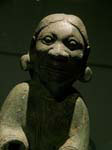 |
The kneeling man on the
right was found at Lijiashan, Jiangchuan county. Western Han Dynasty 206
BC to 8 AD |
 |
|
Woman |
Detail
of Woman |
|
Kneeling
Man |
 |
|
|
|
|
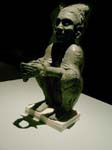
|
The figure of a crouching
woman is slightly smaller than the previous two. It's about a foot
tall. Found at Shizhaishan, Jinning county. Western Han Dynasty 206
BC to 8 AD |
|
This table includes the
figures of an ox and tiger. Found at Lijiashan, Jiangchuan county,
Warring States period, 475 to 221 BC |

|
|
Woman
|
|
|
|
Table
|
 |
|
|
|
|
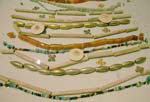
|
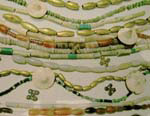
|
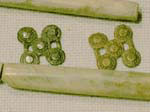
|
The jewelry on the left
was found at Lijiashan, Jiangchuan county. Western Han Dynasty 206 BC to
8 AD. The jade bracelet on the right was also found there but dates
from the Eastern Han Dynasty 25 to 220 AD |
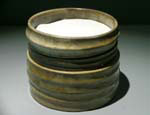
|
| Necklaces
1 |
Necklaces
2 |
Bronze
and gilded catches |
|
Jade
Bracelet |
 |
|
|
|
|
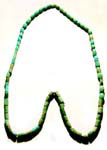 |
The malachite necklace to
the left and the agate necklace to the right were found at Shizhaishan,
Jinning county. Western Han Dynasty 206 BC to 8 AD |
 |
This very wide jade bracelet
could not have been comfortable to wear. Found at Lijiashan, Jiangchuan
county. Western Han Dynasty 206 BC to 8 AD |
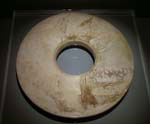 |
| Malachite
Necklace |
|
Agate
Necklace |
|
Wide
Jade Bracelet |
 |
|
|
|
|
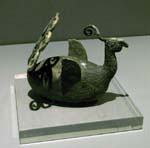
|
Peacock shows attention
to ornamentation. Found at Lijiashan, Jiangchuan county. Western Han
Dynasty 206 BC to 8 AD |
The two cowrie containers
on the right date from the Western Han Dynasty 206 BC to 8 AD. The
first was found at Lijiashan and the second at Shizhaishan. Many
cowrie containers have figures at the side to be used as handles. |
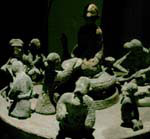
|

|
|
Peacock
|
|
|
Cowrie
Container
|
Cowrie
Container
|
 |
|
|
|
|
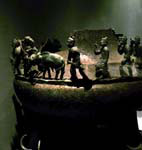
|
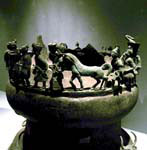
|
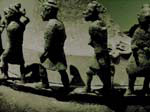
|

|
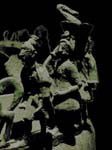
|
|
Tribute
1
|
Tribute
2
|
Tribute
3
|
Tribute
4
|
Tribute
5
|
  |
|
|
|
|
| The cowrie container shown
above depicts a ceremony or occasion when the people were offering tribute.
All sorts of animals and objects are included. Found at Shizhaishan, Jinning
county. Western Han Dynasty 206 BC to 8 AD |
|
The umbrella to the right
measures about 18 inches across and was found at Lijiashan, Jiangchuan
county, Warring States period, 475 to 221 BC |
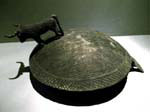 |
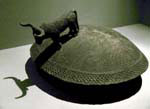 |
|
|
|
Umbrella |
Umbrella
2 |
 |
|
|
|
|
 |
A man sits atop this spoon
which must have served as a dipper. Found at Lijiashan, Jiangchuan
county, Warring States period, 475 to 221 BC |
The dagger or axe on the
right would have been ceremonial rather than practical. Found at Shizhaishan,
Jinning county. Western Han Dynasty 206 BC to 8 AD |
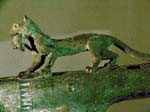 |
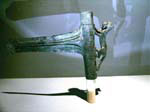 |
| Spoon |
|
|
Dagger
Detail |
Dagger |
|
|
|
|
|





















































